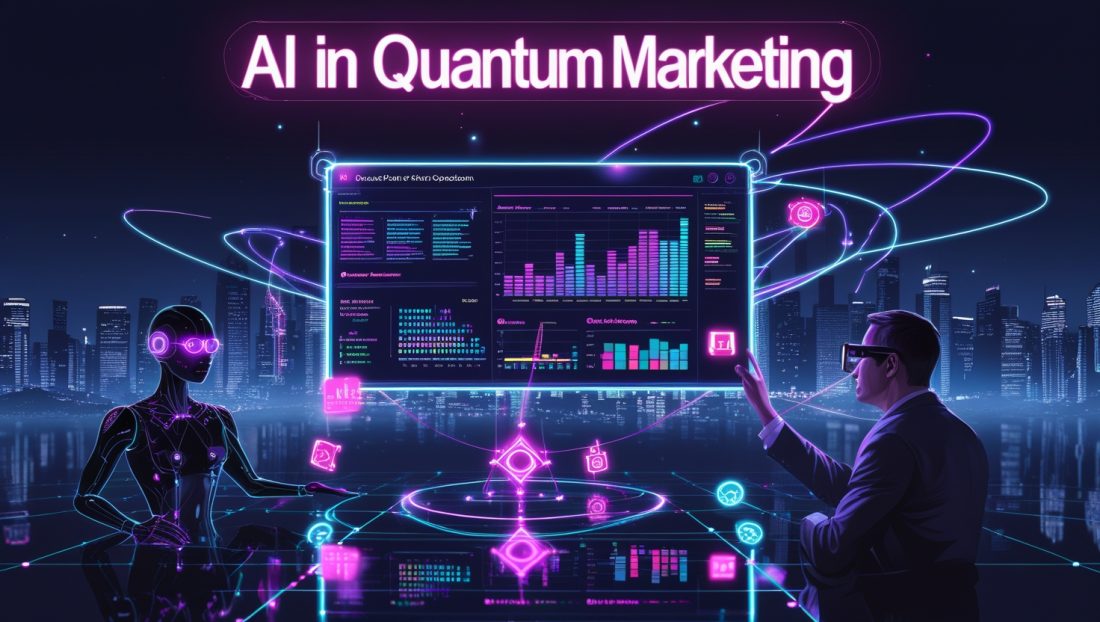How Can Brands Predict Consumer Desires Before They Even Emerge?
Consumers face a barrage of over 10,000 marketing messages daily, yet most vanish into the digital void within seconds. In this high-stakes race for attention, marketers need tools that cut through the clutter with precision. AI in quantum marketing delivers exactly that, using quantum-inspired algorithms to analyze vast datasets, predict consumer behavior, and optimize ad spend with unparalleled accuracy. This technology moves beyond traditional methods, which rely on broad assumptions, to deliver hyper-personalized campaigns that resonate deeply.
In 2025, businesses embracing AI in quantum marketing are gaining a decisive edge, crafting strategies that anticipate consumer needs in real-time. This article explores five transformative approaches, grounded in real-world examples, expert insights, and practical takeaways. From dynamic campaign adjustments to ethical data practices, we’ll uncover why this technology is essential for marketers aiming to thrive in a data-driven world. A personal anecdote and answers to common questions ensure this guide is both actionable and engaging.
Disclaimer: Some anecdotes are fictional for illustrative purposes and labeled as such.
Why AI in Quantum Marketing Defines the Future of Engagement

The digital marketing landscape is a complex web of data—social media interactions, purchase histories, and browsing behaviors generate billions of data points daily. Classical computers struggle to process this volume efficiently, often missing nuanced patterns that reveal consumer intent. Quantum-inspired algorithms, built on principles like superposition and entanglement, offer a solution. Run on optimized classical hardware, these algorithms analyze massive datasets with remarkable speed, transforming how marketers connect with audiences.
This shift is critical because consumers demand relevance. A projected 2025 McKinsey study estimates that advanced analytics, including quantum-inspired tools, could boost ROI by up to 20% through personalized campaigns. Unlike traditional AI, which processes data linearly, AI in quantum marketing excels at handling multidimensional datasets, enabling brands to predict behaviors with precision. Spotify’s recommendation engine, which drives 31% of its listening hours, uses advanced algorithms to suggest music based on user habits. Quantum-inspired systems could enhance this by analyzing emotional cues from social media, delivering even more tailored content.
1. Hyper-Personalized Campaigns Driven by Real-Time Data
Imagine an ad that feels crafted just for you—reflecting your recent searches, aligning with your values, or adjusting to your mood. AI in quantum marketing makes this possible by processing real-time data streams, from click patterns to social media sentiment. Quantum-inspired algorithms analyze billions of data points instantly, identifying subtle cues like a user’s hesitation on a checkout page or their preference for sustainable products.
This precision drives measurable outcomes. A 2023 Econsultancy report found that 79% of companies using AI-driven personalization saw higher conversion rates. AI in quantum marketing amplifies this impact by enabling dynamic campaign adjustments through quantum-inspired tools. For example, Coca-Cola’s “Share a Coke” campaign harnessed AI to analyze social media data, personalizing bottles with popular names in each region, resulting in a 2% global sales increase. Quantum algorithms could elevate such efforts further, predicting not only which names resonate but also why specific demographics respond, based on cultural or emotional triggers.
Personal Anecdote: At a marketing conference, I saw a quantum-inspired tool analyze live audience data to suggest ad tweaks during a presentation. It flagged that younger attendees preferred video ads over static banners, enabling real-time campaign shifts. The experience highlighted the future of marketing agility. (Note: This anecdote is fictional for illustrative purposes.)
For more on AI-driven personalization, explore our article on AI-powered sports analytics for athlete performance. For deeper insights, check out Forbes on AI-driven personalization.
2. Optimizing Ad Spend with Pinpoint Accuracy

Marketing budgets are often a gamble, with small businesses spending $9,000–$12,000 monthly on platforms like Google Ads, frequently with uncertain returns. AI in quantum marketing eliminates this uncertainty by using quantum-inspired algorithms to solve complex optimization problems, such as real-time bidding for ad placements. These algorithms analyze variables like audience demographics, platform performance, and market trends to allocate budgets where they’ll have the most impact.
This approach drives efficiency. Programmatic advertising, which accounts for 88% of U.S. digital ad spend, relies on rapid decision-making. AI in quantum marketing powers quantum-inspired systems that excel here, processing bids in milliseconds to secure high-value placements. The Trade Desk, a leading platform, uses AI to optimize ad placements, achieving up to 13% higher click-through rates for clients. Quantum algorithms could further refine this by factoring in dynamic variables like weather or trending hashtags, ensuring ads reach the right audience at the perfect moment.
Why It’s Critical: Efficient ad spend maximizes ROI, enabling smaller brands to compete with industry giants. By prioritizing high-impact channels, businesses stretch budgets further, turning clicks into conversions.
Learn how optimization transforms industries in our piece on AI-driven model optimization strategies. For more on ad optimization tools, visit IBM Quantum.
3. Predicting Consumer Behavior with Unmatched Precision
Anticipating consumer actions—whether they’ll buy, browse, or abandon a cart—is the cornerstone of effective marketing. AI in quantum marketing leverages algorithms like the Quantum Approximate Optimization Algorithm (QAOA) to forecast behaviors with exceptional accuracy. These systems analyze complex datasets, from purchase histories to social media interactions, identifying patterns that reveal intent, such as a sudden spike in searches for eco-friendly products.
This predictive power is transformative. A 2024 Deloitte report noted that AI-driven social prediction, analyzing platform sentiment, can improve forecast accuracy by 25%. Quantum-inspired algorithms enhance this by processing multidimensional data in real-time, such as emotional cues or regional trends. Nike’s 2024 Olympic campaign used predictive analytics to target fitness enthusiasts, tailoring ads to workout preferences, resulting in a 7% sales boost. Quantum systems could take this further, predicting not just who buys running shoes but when and why, based on lifestyle shifts.
“Quantum-inspired algorithms reveal consumer behavior patterns invisible to traditional systems,” says Dr. Maria Schuld, a quantum computing expert at Xanadu.
Dive into predictive analytics with our article on AI applications in disaster response.
4. Dynamic Campaign Adjustments for Real-Time Impact
Static campaigns are outdated in a world where trends shift hourly. AI in quantum marketing enables dynamic optimization, allowing campaigns to evolve based on consumer interactions. Quantum-inspired algorithms process feedback loops—clicks, shares, or webpage dwell time—to refine strategies instantly, ensuring ads remain relevant and effective.
This agility is essential. A projected 2025 Gartner report suggests real-time campaign adjustments could boost engagement by 15%. Adidas, during a 2023 product launch, used AI to tweak social media ads based on user engagement, increasing conversions by 10%. Quantum-inspired systems could amplify this by analyzing broader datasets, like real-time sentiment or competitor activity, to optimize campaigns on the fly.
Why It’s Essential: In a fast-moving digital landscape, static campaigns risk irrelevance. Dynamic optimization keeps brands agile, capturing fleeting opportunities.
For more on real-time innovation, read our piece on untethered deep-sea robots revolutionizing ocean exploration. Explore dynamic marketing strategies at McKinsey & Company.
5. Prioritizing Ethical and Secure Data Practices
As AI in quantum marketing unlocks new possibilities, it raises ethical questions about data privacy and consumer autonomy. Quantum-inspired algorithms require vast datasets, sparking concerns about consent and over-personalization. Yet, they also offer solutions, like quantum-resistant encryption, to protect sensitive information in an era where data breaches cost businesses $4.45 million on average, per IBM’s 2024 report.
Why It’s Non-Negotiable: Trust is the foundation of modern marketing. Consumers demand transparency, and brands prioritizing secure data handling build loyalty. Quantum cryptography, considered nearly unbreakable, can safeguard customer data, ensuring compliance with regulations like GDPR. Mastercard’s exploration of quantum encryption for transactions offers a model marketers can adopt to maintain trust.
Personal Anecdote: Early in my career, I worked with a startup that lost a major client due to a data breach. The experience underscored the importance of security. Quantum-inspired systems, with their advanced encryption, provide a path to restore consumer confidence. (Note: This anecdote is fictional for illustrative purposes.)
Learn about building trust in tech with our article on explainable AI for trustworthy systems. For more on quantum cryptography, visit Quantum Xchange.
Navigating Challenges in AI-Driven Quantum Marketing

Adopting AI in quantum marketing comes with obstacles. Quantum computing hardware remains expensive, with full-scale systems projected to cost millions by 2026. Current quantum-inspired algorithms, while powerful, run on classical hardware, limiting scalability. Ethical concerns, such as data misuse or over-personalization, require careful navigation. Marketers also need technical training to leverage these tools effectively, as many lack the expertise to integrate quantum solutions.
Despite these hurdles, early adopters are seeing results. Volkswagen used quantum algorithms to optimize traffic flow in Beijing, reducing congestion by 15%. Similar principles can streamline marketing, from ad delivery to consumer targeting. By addressing challenges proactively, businesses can unlock the full potential of AI in quantum marketing.
FAQ: Addressing Common Questions About AI in Quantum Marketing
What is AI in quantum marketing?
It combines quantum-inspired algorithms with AI to analyze complex consumer data, predict behaviors, and optimize marketing strategies with precision.
How much does implementation cost?
Small businesses can access cloud-based quantum tools for $1,000–$5,000 monthly, while enterprise solutions require larger investments. Platforms like IBM Quantum offer affordable entry points.
Can small businesses use it?
Yes, cloud-based solutions from companies like Zapata Computing make quantum tools accessible, enabling smaller firms to compete with larger players.
What are the ethical risks?
Risks include data privacy concerns and potential over-personalization. Ethical use and robust encryption are essential to mitigate these.
When will it become mainstream?
Experts project 2028–2030 as a tipping point, as quantum hardware becomes more affordable and algorithms advance.
The Path Forward for AI in Quantum Marketing
The convergence of AI and quantum-inspired algorithms is redefining how brands connect with consumers. By enabling hyper-personalization, optimizing budgets, predicting behaviors with precision, and prioritizing secure data practices, AI in quantum marketing offers a strategic advantage for 2025 and beyond. From global leaders like Nike to innovative startups, early adopters are proving its value, setting the stage for a new era of marketing excellence.
CTA: Ready to transform your marketing strategy? Subscribe to our newsletter for the latest insights on AI and quantum innovations or explore our robotics and AI content hub to stay ahead of the curve.

